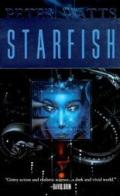
| Publisher: | Tor |
| Copyright: | July 1999 |
| Printing: | February 2000 |
| ISBN: | 0-812-57585-7 |
| Format: | Mass market |
| Pages: | 374 |
This is a near-future, dark, hard science fiction novel, the first of a two-book series (at least currently). It's centered around a deep sea habitat, technology that lets humans swim with minimal protection at the very bottom of the deepest ocean trenches, and the psychology of people who survive and thrive in that environment (people who would be rather broken and dysfunctional in normal society). About the first half of the book sets the environment and the psychology of the main characters, and then the plot really starts developing in the next quarter and wraps up with a quick series of revelations in the final quarter.
The third quarter of this book was for me the best part. The characters are largely unlikeable and even annoying, but by that point I'd warmed at least to Lenie Clarke, the main viewpoint character for nearly all of the book, and the atmosphere of the deep rift and the culture among the rifters had been developed to a point where the story just flowed. Everything comes together beautifully for about fifty pages and makes slogging through the occasional hard-going in the beginning worthwhile.
The ending then goes someplace rather different than the feel of the rest of the book, quickly adding in some odd bits of biology (that I didn't find particularly credible) and a plot revolving around computer networks and artificial intelligence. While the ending isn't bad, I found the revelations didn't live up to my expectations from the build-up, and the book takes on a more hard-bitten near-cypherpunk tone that's jarring after the dark and dreamlike feeling of the first three quarters.
I'm not sure whether I'd recommend this book or not. The characters are a real problem; not only do I not particularly like any of them except Lenie, I don't particularly care about any of them except Lenie. She requires quite a bit of time to care about, and the others vary between annoying, to interesting then disappointing, to just placeholder non-entities. This is a significant drawback.
On the other hand, the description of the ocean trenches is beautiful and engrossing, and the psychology of the place slowly starts to make a certain intriguing dark sense. That third quarter is truly excellent, and the ending, even if jarring, is still intriguing. I'm going to start the sequel right away, so clearly there's something here to recommend. The book settled into the back of my mind, and I keep thinking about it. Just be prepared to slog through a slow first half.
Followed by Maelstrom.
Reviewed: 2004-05-03